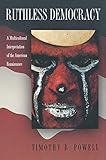Ruthless Democracy : A Multicultural Interpretation of the American Renaissance / Timothy B. Powell.
Material type: TextPublisher: Princeton, NJ : Princeton University Press, [2021]Copyright date: ©2000Description: 1 online resource (224 p.)Content type:
TextPublisher: Princeton, NJ : Princeton University Press, [2021]Copyright date: ©2000Description: 1 online resource (224 p.)Content type: - 9780691227771
- American literature -- Minority authors -- History and criticism
- American literature -- 19th century -- History and criticism
- Cultural pluralism in literature
- Democracy in literature
- Ethnic groups in literature
- Ethnicity in literature
- Literature and society -- United States -- History -- 19th century
- Minorities in literature
- Minorities -- United States -- Intellectual life
- LITERARY CRITICISM / American / General
- Abolition
- Aesthetics
- American: colonization
- Anthropology
- Beaver, Harold
- Bercovitch, Sacvan
- Brown, Charles
- Calhoun, John C
- Capitalism
- Cherokee Phoenix
- Cherokee
- Colonization
- Cultural Studies
- Democracy
- Digger Indians
- Disability
- Doctrine of Discovery
- Domesticity
- Economy
- Feminism
- Forgetting
- Free Soil Movement
- Garrison, William Lloyd
- Gleiter, Karin
- Hermeneutics
- Hybridity
- Ideology
- Indian Removal Act
- Industrial Revolution
- Jarvis, Edward
- Jefferson, Thomas
- Kinshasa, Kwando Μ
- Know-Nothings
- Leslie, Joshua
- Lubiano, Wahneema
- Masculinity
- Mexican-American War
- Minstrelsy
- Miscegenation
- Monoculturalism
- Nationalism
- Nativism
- Naumkeag Indians
- Owens, Louis
- Philosophy
- Postnationalism
- Queerness
- Radical democracy
- Roberts, Joseph Jenkins
- Ruthless democracy
- Seneca Falls Convention
- Sentimental Imperialism
- Stowe, Calvin
- 810.9/920693 23
- PS153.M56
- PS153.M56 P69 2000
- online - DeGruyter
| Item type | Current library | Call number | URL | Status | Notes | Barcode | |
|---|---|---|---|---|---|---|---|
 eBook
eBook
|
Biblioteca "Angelicum" Pont. Univ. S.Tommaso d'Aquino Nuvola online | online - DeGruyter (Browse shelf(Opens below)) | Online access | Not for loan (Accesso limitato) | Accesso per gli utenti autorizzati / Access for authorized users | (dgr)9780691227771 |
Frontmatter -- CONTENTS -- ACKNOWLEDGMENTS -- Historical Interlude -- INTRODUCTION. THEORIZING RUTHLESS DEMOCRACY -- PART I: BEYOND NEW ENGLAND -- PART II: TOWARD A TRANSNATIONAL UNDERSTANDING OF "AMERICAN" IDENTITY -- NOTES -- BIBLIOGRAPHY -- INDEX
restricted access online access with authorization star
http://purl.org/coar/access_right/c_16ec
In Ruthless Democracy, Timothy Powell reimagines the canonical origins of "American" identity by juxtaposing authors such as Hawthorne, Melville, and Thoreau with Native American, African American, and women authors. Taking his title from Melville, Powell identifies an unresolvable conflict between America's multicultural history and its violent will to monoculturalism. Powell challenges existing perceptions of the American Renaissance--the period at the heart of the American canon and its evolutions--by expanding the parameters of American identity. Drawing on the critical traditions of cultural studies and new historicism, Powell invents a new critical paradigm called "historical multiculturalism." Moving beyond the polarizing rhetoric of the culture wars, Powell grounds his multicultural conception of American identity in careful historical analysis. Ruthless Democracy extends the cultural and geographical boundaries of the American Renaissance beyond the northeast to Indian Territory, Alta California, and the transnational sphere that Powell calls the American Diaspora. Arguing for the inclusion of new works, Powell envisions the canon of the American Renaissance as a fluid dialogue of disparate cultural voices.
Mode of access: Internet via World Wide Web.
In English.
Description based on online resource; title from PDF title page (publisher's Web site, viewed 07. Nov 2022)


